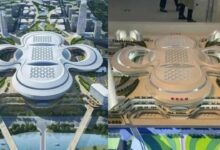COVID in Bangladesh: How have lockdowns plunged millions into poverty?

Pandemic lockdowns have pushed an estimated 32 million people below the poverty line in Bangladesh, according to a new livelihood survey conducted by two leading research organizations.
Critics say that the stark increase in poverty in the country is due to a lack of government response to the economic crisis brought by the pandemic and a spike in fuel prices.
The multiphase survey included around 5,000 households across the country.
It was conducted between April 2020 and August 2021 by the Power and Participation Research Centre (PPRC) and BRAC Institute of Governance and Development (BIGD) to evaluate health and economic crises among low-income communities due to COVID-19.
“Rural and urban slum households who were vulnerable before COVID-19 remain the most affected population group,” the survey said.
“Two-thirds of the households in this group were in poverty as of August this year.”
The study found that income dropped by 18% in slums and by 15% in villages from the levels in March this year, a period when the economy had largely recovered from the first lockdown at the start of the pandemic.
“Income and employment uncertainties over 18 months gave rise to several vulnerabilities. Many have switched occupations, often finding whatever they could for survival, creating a risk of shifting to worse jobs,” the survey stated.
Recovery ‘reversed’ by second lockdown
Hossain Zillur Rahman, the executive chairman of PPRC, said the estimation that 19.54% of Bangladesh’s population has been pushed into poverty was determined by extrapolating the results of the survey of households on a national level.
“We found that the livelihood of many people had been gradually recovering after Bangladesh was severely hit by the first lockdown in April 2020, but the latest lockdown that was imposed earlier this year has reversed the recovery trend,” he told DW.
“Ordinary people who suffered financially due to the lockdowns are losing their capacity to cope [financially], which leaves a large number of people in risky situations,” the economist stressed.
However, while experts agree that the level of poverty has risen substantially in the last year, some say that the survey is too limited to offer an accurate picture of the new economic situation in Bangladesh.
Nazneen Ahmed, the country economist of the United Nations Development Programme (UNDP), agrees that COVID-19 has hit poor communities hard. However, she has doubts about the estimated figure published in the survey.
“It is not a census, it’s a survey of a small number of people, and the data found from it was blown up to find a national projection,” she told DW.
“It’s hard to say exactly how many people have become poor due to the COVID-19 lockdowns,” she added.
“Poor communities who were hit hard byCOVID-19 lockdowns are gradually recovering. As lockdowns are over, even informal sectors are growing again,” Ahmed told DW.
“Some people who became poor because of the closures of some industries during the lockdowns haven’t been able to recover yet,” she added.
Fuel price hike strikes blow to economy
The price of consumer goods such as rice, vegetable oil and lentils, has increased in recent months in Bangladesh after the second lockdown was relaxed in August this year.
The government even recently hiked the price of fuel by 23%, which further increased the price of public transport, irrigation and other living costs.
Both economists agree that the price hikes could badly impact people’s financial recovery.
“The government could have reassessed the situation before drastically increasing the price of diesel and kerosene at this period when the economy is still recovering from the lockdowns,” said Ahmed.
“PetroBangla, the government-owned national oil company of Bangladesh, has made profits in the past few years by trading fuel at a higher price than the international market rate. It could have subsidized the price using those profits, instead of increasing it,” she added.
Economist Rahman echoed that sentiment, saying that the government has increased the fuel price at a time when people need government support to recover from the impacts of the lockdown.
Income inequality on the rise
The survey was published at a time when Bangladesh’s per capita income rose by $327 (€288) to $2,554 in the fiscal year 2020-21, according to data from the government’s statistical agency.
Ahmed said, however, that despite the increase, there is a growing trend of income inequality in the country.
“If per capita income increases at a time when many newly poor people still have not recovered, it means that people who already have money in their hands have earned a lot more in recent years. It indicates that income inequality is growing in the country.”
Rahman also sees a gap between the government statistics and the economic reality of his country.
“The Trading Corporation of Bangladesh (TCB) offers commodity goods at subsidized prices in urban areas. We see the lines growing in front of its centers as more and more ordinary people try to buy goods from there,” he told DW.
“We are not getting the actual picture from the statistics.”
SOURCE: DW News
Join the conversation and have your say on Thailand news published on The Thaiger.
Thaiger Talk is our new Thaiger Community where you can join the discussion on everything happening in Thailand right now.
Please note that articles are not posted to the forum instantly and can take up to 20 min before being visible. Click for more information and the Thaiger Talk Guidelines.









